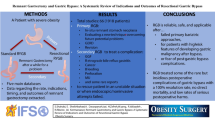Abstract
Background
As with new laparoscopic techniques, the ability to convince surgeons and gastroenterologists to embrace endolumenal techniques and the additional training required to perform the new procedures will correlate with how rapidly endolumenal therapies are adopted. The authors measured their ability to change attitudes among surgeons, who may or may not perform endoscopy as a part of their practice, toward endolumenal therapies.
Methods
As part of the endoluminal therapy postgraduate course presented at the annual Society of American Gastrointestinal Endoscopic Surgeons (SAGES) meeting in Ft. Lauderdale, Florida 2005, experts presented current literature and data on new endolumenal techniques. The participants, primarily of surgeons, were polled electronically about a number of case scenarios before and after their presentation. Each scenario was relevant to the topic presented and chosen to reflect potentially controversial disease processes with traditional or endolumenal treatment options. The responses were collected in real time and displayed to course participants.
Results
A panel of 10 experts presented data on a range of endolumenal therapies including endolumenal treatment for gastroesophageal reflux disease (GERD), endoscopic stenting, endoscopic treatments in bariatric surgery, intraoperative endoscopy, endoscopic mucosal resection (EMR), transanal endoscopic microsurgery (TEM), mucosal ablation for Barrett’s esophagus, intralumenal resection, translumenal endoscopic surgery, and how to educate surgeons in new endolumenal techniques. Demographic data showed that 83.6% of the participants performed endoscopy as part of their practice. A comparison with traditional surgical options showed a statistically significant positive attitude change (p < 0.05) toward adoption of most endolumenal techniques after expert presentation. Only EMR and TEM did not show a statistically significant change in the participants’ willingness to adopt these techniques. There was no significant change in the attitudes of how best to train surgeons. After presentation of the training options, 76% of the respondents believed that these techniques should be taught in residency.
Conclusions
The education of surgeons in new endolumenal therapeutic techniques can have a significant impact in terms of changing practice attitudes and may accelerate adoption of new endoscopic techniques.
Similar content being viewed by others
References
ASGE/SAGES Working Group on Natural Orifice Translumenal Endoscopic Surgery (2006) White Paper, October 2005. Gastrointest Endosc 63: 199–203
Cahill D, Cook J, Sithers A, Edwards J, Kenkins J (2002) Evaluation of an online postgraduate education programme. Med Teach 24: 425–428
Tichon JG (2002) Problem-based learning: a case study in providing e-health education using the Internet. J Telemed Telecare 8 Suppl 3:S3:66–68
Acknowledgments
We acknowledge all the participants in this postgraduate course, both as instructors and as a willing audience that responded to questions. The following lecturers gave of their time and expertise in the presentation of current data and literature on the selected topics:
• What’s new in endoluminal surgery for GERD: William Richards, M.D.
• New technologies in esophageal stricture management and stenting: Jeffrey Marks, M.D.
• Latest uses of endoscopy in the operating room: Keith Gercin, M.D.
• Endoscopic mucosal resection: Should we be doing more in the United States: Jun-ichi Tanaka, M.D.
• Transanal endoscopic microsurgery: Lee Smith, M.D.
• Latest technologies for mucosal ablation: David Utley, M.D.
• New devices for intraluminal resection: Sang Lee, M.D.
• Endoscopic issues in bariatric surgery: Philip Schauer, M.D.
• Transluminal therapies: Jeffrey Ponsky, M.D.
• How do I learn this stuff? John Mellinger, M.D.
Author information
Authors and Affiliations
Corresponding author
Rights and permissions
About this article
Cite this article
Hazey, J.W., Dunkin, B.J. & Melvin, W.S. Changing attitudes toward endolumenal therapy. Surg Endosc 21, 445–448 (2007). https://doi.org/10.1007/s00464-006-9001-2
Published:
Issue Date:
DOI: https://doi.org/10.1007/s00464-006-9001-2




